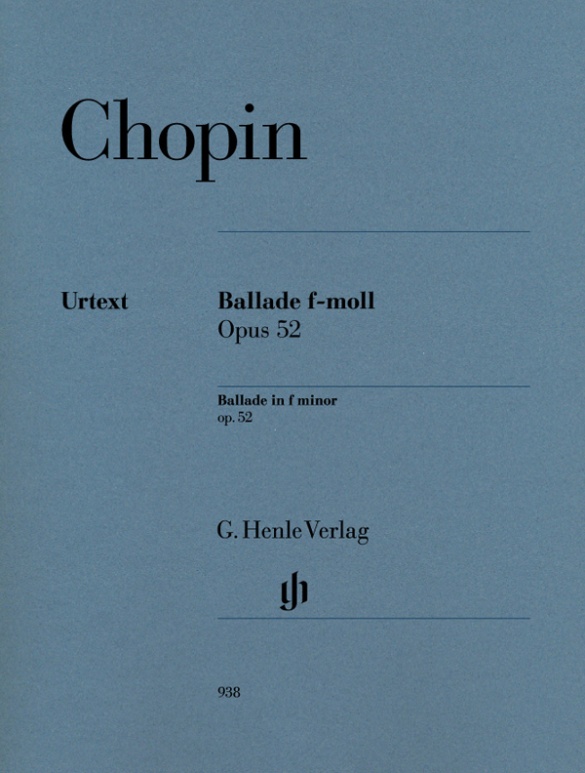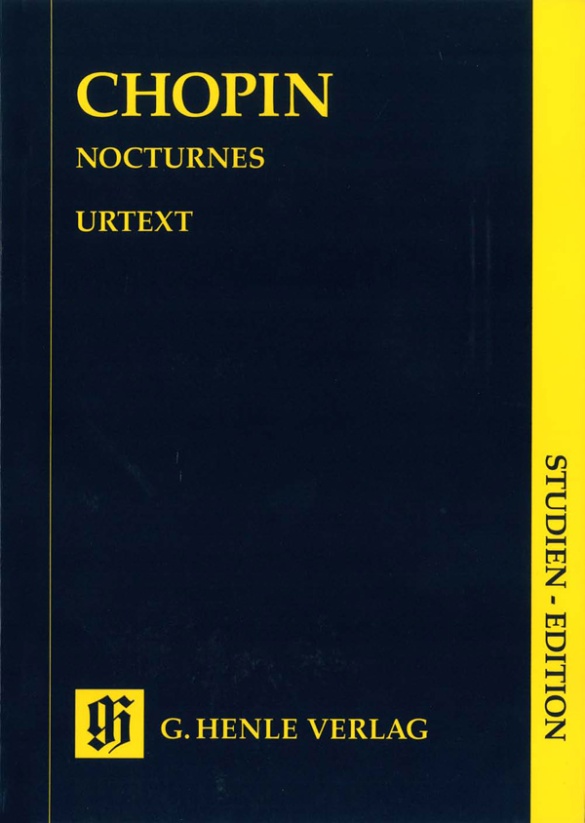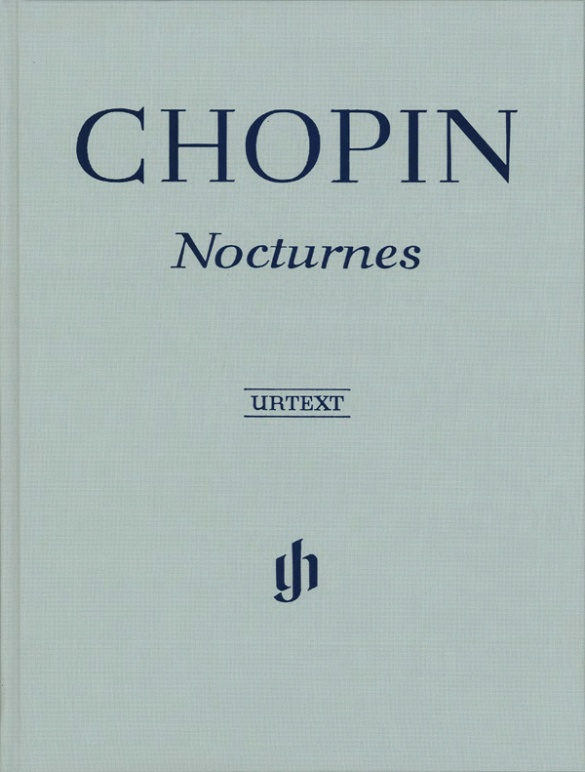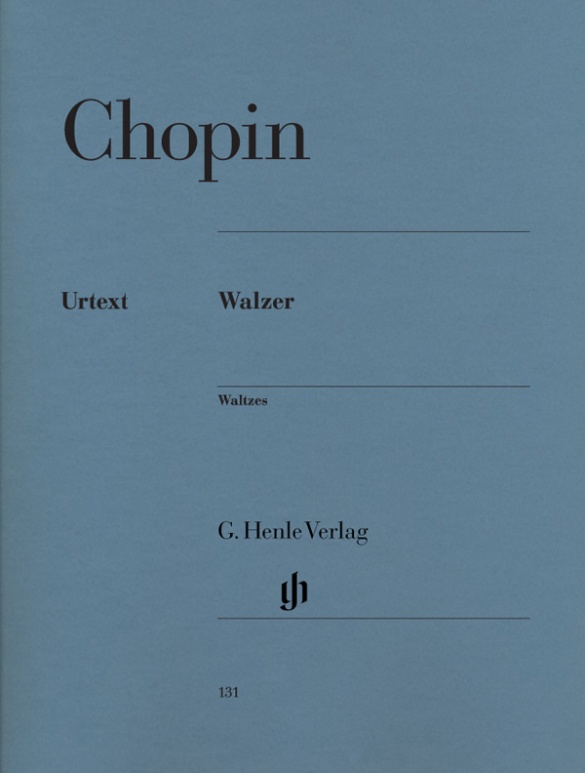

Frédéric Chopin
Valses
Si Chopin révolutionna le genre de l’étude, il anoblit celui de la valse. Toute sa vie durant, il revint à ce genre, qu’il embrassa sous toutes ses formes, des morceaux de bravoure – les Grandes Valses Brillantes – aux tableaux imprégnés de la plus profonde mélancolie. Ces œuvres ont cependant toutes un point commun: il est impossible et interdit de danser sur cette musique! Notre volume comporte l’intégralité des Valses de Chopin, parues de son vivant ou à titre posthume, parmi lesquelles de véritables traits de génie, comme la valse surnommée la «Valse du petit chien», op. 64, n°1. Lorsqu’il existe deux versions authentiques de la même valse, nous présentons bien entendu une version Urtext de chacune d’entre elles.
CONTENU/DÉTAILS
CONCERNANT LE COMPOSITEUR
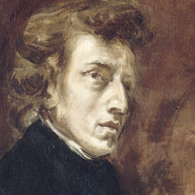
Frédéric Chopin
Pianiste et compositeur. Son œuvre, centrée sur la musique de piano, jouit d’une extraordinaire popularité et fait désormais partie intégrante du répertoire de concert. Sa musique a influencé les générations futures de compositeurs français (Franck, Saint-Saëns, Fauré, Debussy), mais aussi Smetana, Dvořák, Balakirev, Grieg, Albéniz.
| 1810 | Né le 1er mars à Želazowa Wola près de Varsovie. Premières compositions à l’âge de 7 ans. Première audition publique à l’âge de 8 ans. |
| 1822 | Cours privés de composition. |
| 1825 | Publication d’une première œuvre, le Rondo en Ut mineur op. 1. |
| 1826–29 | Études à l’École supérieure de musique à Varsovie. |
| 1829 | «Fantaisie sur des airs nationaux polonais» en La majeur op. 13, Trio avec piano en Sol mineur op. 8. Voyage à Vienne où il donne deux académies avec ses compositions et des improvisations. |
| 1829–33 et 1835–37 | Les Études op. 10 et op. 25 s’imposent comme un nouveau type d’étude virtuose à ambition esthétique. |
| 1830 | Création de ses deux Concertos pour piano en Fa mineur op. 21 et Mi mineur op. 11 à Varsovie. |
| 1831 | Ne pouvant retourner à Varsovie en raison de l’insurrection polonaise, il se rend à Paris où il demeure jusqu’à la fin de sa vie. |
| 1832 | Concert inaugural à Paris avec un grand succès. |
| 1835/38 | «Trois valses brillantes» op. 34. |
| 1836/39 | «24 Préludes» op. 28: une série de brèves pièces densément structurées et à déroulement cyclique. |
| 1835/39 | Sonate pour piano en Si bémol mineur op. 35 avec la Marche funèbre. |
| 1842/43 | Ballade n° 4 en Fa mineur op. 52, «Grande Polonaise brillante» en La bémol majeur op. 53, Scherzo n° 4 en Mi majeur op. 54. |
| 1833 | Sonate pour piano en Si mineur op. 58. |
| 1849 | Achèvement des Mazurkas en Sol mineur et Fa mineur. Meurt le 17 octobre à Paris. |
About the Authors
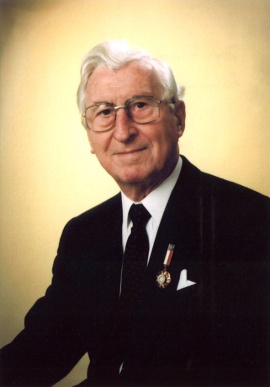
Ewald Zimmermann (Editeur)
Dr. Ewald Zimmermann (1910–1998) studied the piano (Privatmusiklehrer-Examen with Eduard Erdmann) and musicology, doing a doctorate in the latter following his time as a soldier in World War II and subsequent time as a prisoner of war in Russia. In 1953 he became the first editor in the history of G. Henle Publishers, where he worked for 22 years alongside the founder of the publishing house, Günter Henle, in Duisburg, actively and deftly supporting the young company’s initial steps. Zimmermann was in charge of almost all of the Urtext editions that were produced in his time, himself editing several volumes, including all of Frédéric Chopin’s works for piano. Under his direction, the first scholarly catalogue of Chopin’s musical works of the time (Krystyna Kobylańska) was produced, issued by G. Henle publishers in 1980.
In 1991 Zimmermann was honoured for his efforts with the Chopin Medal by the Chopin Society in Warsaw, and shortly afterwards received the order “Mérite en faveur de la culture polonaise” from the Polish government. Even after he had retired in 1975, during which time he devoted himself more intensively to playing the piano, he still retained close ties with the publishing house, remained in close contact with his successors and continued editing.
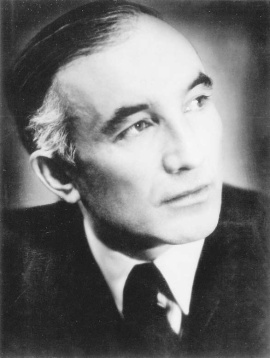
Hans-Martin Theopold (Doigtés)
Prof. Hans-Martin Theopold, was born to a pastor’s family in Detmold on 22 April 1904, the youngest of five children. Even as a child he often played the organ in the “Marktkirche” and soon began to take piano lessons with Theodor Vehmeier. At the age of 17 he made his debut at the Landestheater in Detmold with Ludwig van Beethoven’s Piano Concerto in C major under Friedrich Quast (Herford). Following the successful completion of his schooling at the Gymnasium Leopoldinum in Detmold, he went on to study music and piano (main subject): from 1922–23 at the “Württembergische Hochschule für Musik” in Stuttgart (with Max Pauer, 1866–1945) and then from 1923–1928 at the “Staatliche Akademische Hochschule für Musik” in Berlin-Charlottenburg (with Richard Rössler, 1880–1962, and Waldemar Lütschg, 1877–1948). After completing his piano studies (graduating with “very good”) in 1928, he began an active solo career both at home and abroad (USA, Switzerland, Scandinavia, the Baltic states, the Balkans). As a member of the Chamber Music Association of the State Opera in Berlin (from 1933) he also gave countless chamber music concerts, including ones with his violin partner Gustav Havemann (1882–1960).
In the 1930s, audiences and the press alike raved about Theopold’s extraordinary gifts as a pianist: “This young player has it in him to soon become one of the best players in Germany. A superior technique, a wonderful singing piano tone, the strength of a Titan, but not at all hard due to the incomparably gentle elasticity of his touch” [Münchener Zeitung, 21 November 1933]. – “H.M. Theopold gave convincing proof of his splendid pianistic ability in an extremely gripping sonata with a modern idiom by Alban Berg, but predominantly in Schubert’s […] Wanderer Fantasy, which he played with a polished technique and creative power” [Weser-Zeitung, 21 December 1932]. Theopold was awarded several prizes, including the “Grotrian-Steinweg-Preis” in 1928.
In 1937 Theopold became a teacher for the piano (main subject) at the “Bayerisches Staatskonservatorium der Musik” in Würzburg. In 1939 he married Irene Tatjana Wülfing, who was from Moscow. From 1943 he became head of the piano master-class at the “Nordische Musikschule” in Bremen, although this was interrupted by the events of the war. Following his return from a prisoner of war camp, Theopold gave concerts and taught although he did not hold a permanent position. From 1955–1956 he was acting head of the piano master-class at the “Bergisches Landeskonservatorium” in Wuppertal, finally being appointed Professor for Piano on 1 April 1956 at the “Staatliches Institut für Schul- und Volksmusik” in Detmold, later at the “Nordwestdeutsche Musikakademie Detmold” (today “Hochschule für Musik Detmold”), where he taught for decades. On 30 September 1969 he retired. “His students extol his pedagogical gifts. […] Humour, charm, helpfulness and kind-heartedness moderate the strictness of his professional ethos as a musician and teacher” (Lippische Rundschau, 23 April 1969; see also: Lippische Landeszeitung 22 April 1969 on the occasion of Theopold’s 65. birthday: “Prof. Theopold, a modest but at the same time energetic man, is an enthusiastic teacher”). Theopold died in Detmold in 2000.
Contact with Günter Henle was established directly after the publishing house was founded, when Theopold thanked the publishers with great enthusiasm for its first Urtext editions. His extensive correspondence with the publishing house was bequeathed to the Lippische Landesbibliothek in 2014 to ensure its long-term accessibility to the public. The letters testify not only to Theopold’s great interest in musical sources and text questions but also to his initial strict refusal (!) of fingerings in text-critical editions such as these: “For fingerings are and remain something individual no matter what their quality” (letter to Günter Henle from 26 May 1949 {publishing house archives}). Günter Henle was not, however, to be swayed and stressed the necessity of fingerings in his Urtext editions: “It is better to publish the Urtext […] with fingerings that are not necessary for a few individuals, or that might even, I admit, be considered irritating here and there” (letter to Hans-Martin Theopold of 17 September 1953).
It was only in 1955 that Theopold accepted Günter Henle’s offer of contributing fingerings for an Urtext edition that was in the process of being prepared by way of trial. (HN 74, Schubert, Complete Dances for Piano, Volume 1). Following this, Theopold was commissioned to write the fingerings for nearly all of the publishing house’s new editions in quick succession. Günter Henle, himself a good pianist, greatly valued Theopold’s fingerings, and also the many suggestions regarding the musical text in question. In addition, Theopold was always very reliable, thorough and conscientious – something that is not unimportant with editorial work!
Thus to date Hans-Martin Theopold has provided the fingerings for the greatest number of Henle Urtext editions by far – 226 editions (!) in total.
We would like to thank Mrs Margot Theopold and the Hochschule für Musik in Detmold for their great support in providing biographical material.
G. Henle Verlag
Informations sur la sécurité du produit

G. Henle Verlag
Vous trouverez ici des informations sur le fabricant du produit.G. Henle Verlag e.K.
Forstenrieder Allee 122
81476 München
Allemagne
info@henle.de
www.henle.com
recommandations
autogenerated_cross_selling
Autres éditions de ce titre


